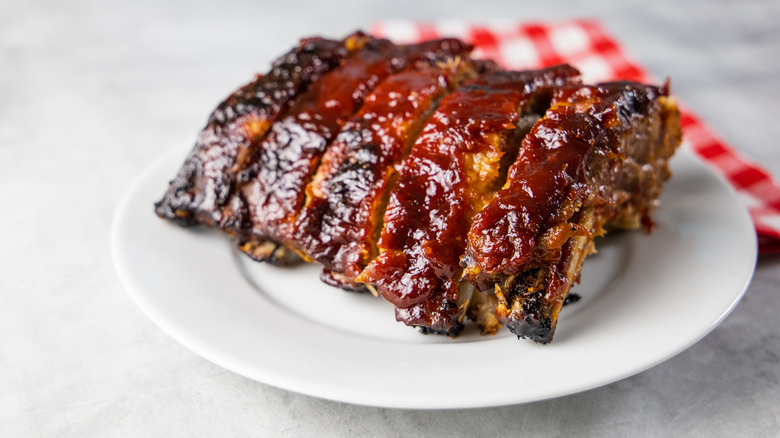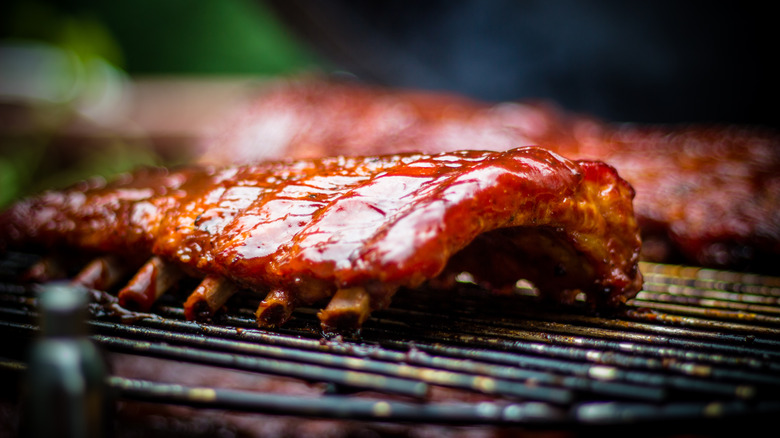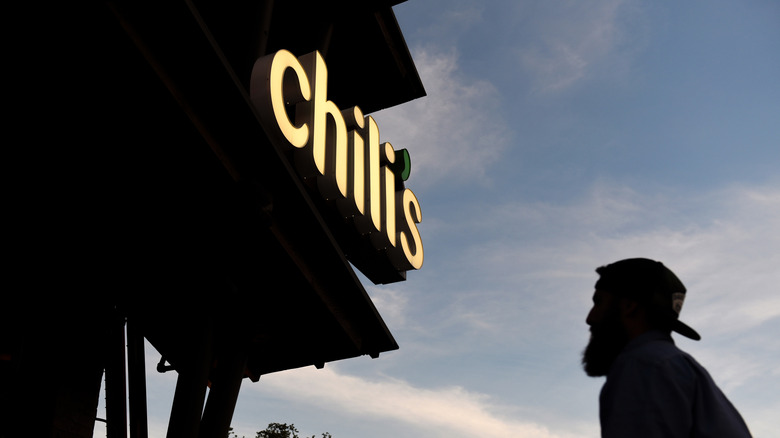The Story Behind Chili's Famous 'Baby Back Ribs' Jingle
According to their website, the restaurant chain Chili's started off humbly enough as a simple hamburger joint. After its founding in 1975, Chili's burgers eventually gave way to what the chain is best known for today: those delicious baby back ribs. The casual dining establishment took an innovative step toward change when the company was acquired by entrepreneur Norman E. Brinker in 1983 — a purchase that, at the time, was dubbed his "greatest success," as The New York Times noted in Brinker's 2009 obituary. For all of Brinker's history and accomplishments, his Chili's brand will undoubtedly always be associated with its mouth-watering baby back ribs. But why?
A catchy advertising jingle helped to bring the BBQ-sauce-smothered fare to prominence, and a version of the song still promotes the product today, even though the lyrics were modified for the Chili's "Bigger Than Ribs" promo in 2017. A year after Norman Brinker acquired the one-time burger restaurant, Chili's took its first step toward change when their sizzling fajitas were added to the menu. Not long after that, those famous Chili's baby back ribs showed up two short years later in 1986.
The first Chili's "Baby Back Ribs" television commercial promoted the new menu item in 1989, and the catchy ad was the precursor to the impossibly hard-to-get-out-of-your-head jingle fans all know and love (or loathe) today. But do you know the whole story behind the memorable "Baby Back Ribs" song?
'Baby back, baby back, baby back' history
Following the 1989 release of Chili's baby back ribs TV commercial, the restaurant hired the GSD&M agency to create a brand-new promotional song. The original rendition clearly lacked the spoon-and-glass-tapping synergy that made the famously indelible "Baby Back Ribs" jingle so unforgettable, and it was the advertising creative director and copywriter, Guy Bommarito, who conceived the new Chili's "Baby Back Ribs" concept in the 1990s. However, he did so under protest.
"We did it because the client insisted on it," Bommarito said in an interview with Great Big Story. "We never would have done it otherwise. I was so embarrassed to take the assignment back to my creative department that I just wrote it myself." Bommarito revealed that jingles were the "heart and soul" of the advertising industry, but by the 1990s they were also quite "annoying" and "unpleasant." (For some examples, look no further than Mentos' "The Freshmaker" TV spots, or Kit Kat's "Give Me a Break" promos, among others.)
Regardless of how maddening the jingle arguably is, Bommarito's "Baby Back Ribs" was a roaring success for Chili's. But even with that being said, neither Bommarito nor the franchise could have anticipated the even more widespread and unprecedented popularity the jingle would achieve.
Jingle-all-the-way popularity
Guy Bommarito didn't have an inkling the song he conceived for Chili's would enjoy such ubiquity or longevity. ("I thought it'd be gone after six weeks," Bommarito remarked while speaking with Great Big Story.) But nearly three decades later, Chili's "Baby Back Ribs" jingle has unquestionably made its mark on popular culture.
First, actor Mike Myers put the words of the "Baby Back Ribs" song into the unharmonious mouth of Dr. Evil's henchman, Fat Bastard, in "Austin Powers: The Spy Who Shagged Me." Then there was the Golden Globe's rendition of the jingle performed by NSYNC's Justin Timberlake. Lastly, Season 2 of "The Office" featured Michael Scott (played by Steve Carell) winning over a new Dunder Mifflin client named Christian (played by Tim Meadows) during a business meeting at the local Chili's, during which the characters sang the jingle in a boisterous duet. All in all, despite Bommarito's objections — and whether consumers actually like the jingle or not, Chili's "Baby Back Ribs" — remains a pop culture touchstone.
Even so, that comes with a price. Chili's "Baby Back Ribs" is ranked No. 16 by Entertainment Weekly on the outlet's all-time "Most Annoying Jingles" listicle as of this writing, and it's not surprising to Bommarito that the song remains divisive. "People would either say, 'That's my favorite song, I love it,' or they would say, 'If I hear that song one more time, I'm going to stick a fork in my eye," said Bommarito.


